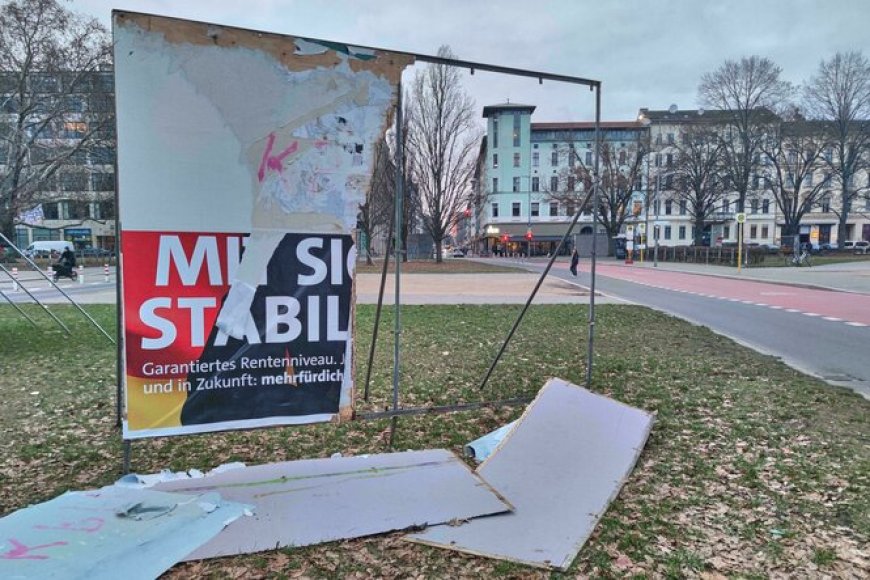Underestimated and neglected
The parties are close to people during the election campaign when it comes to fears about migration. They hardly care about people with a migration history.

erlin-Kreuzberg on a Tuesday afternoon in late January: "The others aren't any better, they don't do anything either," answers a Turkish-born family father in his mid-thirties when Ayşe Demir asks him whether he will vote on February 23. He is standing in front of a bakery, drinking a coffee, and when it is pointed out that this election is about opposing the right-wing extremists, he answers: "Yes, I understand you. But I also understand the AfD on some points." Demir discusses briefly, then moves on.
The spokesperson for the board of the Turkish Federation in Berlin-Brandenburg has been going out with colleagues these days to encourage people of Turkish origin to vote. The group repeatedly speaks to people this afternoon who assure them that they will vote for a democratic party. But the father of a family in front of the bakery is not the only one who is somewhere between "no interest" and "why not the AfD?"
A few weeks later, on a sunny Sunday afternoon in the hall of the Alevi community in Berlin: Six Bundestag candidates have been invited to a panel discussion, many have come to listen to them, but about half of the seats are still free. The discussion is about social justice and climate change, about war and arms deliveries and about the dominant election campaign issue of migration.
Ferat Koçak from the Left Party receives a lot of applause when he talks about rising living costs and calls for higher taxes on the rich. SPD politician Hakan Demir also receives a lot of applause when he promises to defend the liberalized citizenship law against the CDU's advances. But Sevim Dağdelen from the Sahra Wagenknecht Alliance (BSW) receives the most applause when she speaks out against arms deliveries to Israel and Ukraine and calls for Germany to buy gas from Russia again.
The BSW tries the Middle East conflict
On February 23, almost seven million people with a migration background will be able to cast their votes in the federal election. That is 12 percent of all eligible voters. Of the approximately three million people of Turkish origin in Germany , almost one million are eligible to vote . They traditionally voted Social Democratic, as most people of Turkish origin or their ancestors once came to Germany as workers. However, as life realities change, preferences also become more differentiated.
Since the first Turkish guest workers arrived in the 1960s, the political landscape in Germany has also changed fundamentally. The right-wing extremist AfD is at 20 percent in current polls, and the populist BSW could overcome the five percent hurdle. These changes are also affecting people with a migration background.
A study by the German Center for Integration and Migration Research ( DeZIM) shows that almost a fifth of people with roots in Turkey, the Middle East or North Africa can imagine voting for the AfD. In addition, the BSW has a higher voter potential among people with a migration history than among people without. People with a migration history are therefore also susceptible to the AfD's racist resentment. The BSW - this is noticeable at campaign events in the communities, for example - also tries to score points with the topic of the Middle East conflict, with anti-Israel and anti-Western narratives.
What this study also shows is that people with a migration background view their material situation, their pension provision and crime with “significant greater concern” than people without a migration background. People with a migration background also more frequently state that they do not perceive any party as competent. They are less likely to believe that parties can solve the most important problems.
Why is that?
"Parties in the democratic center have completely failed to develop a professional approach to migrant communities," says Özgür Özvatan, migration researcher and political consultant. Recently, Özvatan has been focusing on the parties' digital communication. Voters with a migration background already had the potential to make an important difference in the last federal election in 2021.
part of one's own biography as an election campaign hit
He says of the attractiveness of the BSW and the AfD for people with a migration background: "The loss of trust in the democratic parties is great. Many have the feeling: it makes no difference who I vote for." Voter turnout among people with a migration background is significantly lower than in the general population.
In fact, it is striking that the parties rarely explicitly address people with a migration background during their election campaigns, neither in terms of content nor in their native languages. In the USA, Republicans and Democrats campaign in Spanish as a matter of course. These parties also do not seem to really care about representation. They are only rudimentarily diverse and in the back rows.
In the BSW, on the other hand, says migration researcher Özvatan, politicians with a migration background are overrepresented. In democratic parties, they often do not occupy powerful positions and are repeatedly confronted with the accusation of pursuing clientelist politics for their milieus of origin.
The fact that migration is now the dominant election campaign issue may also be met with approval by some people with a migration background. Many more of them are likely to be further alienated from the democratic parties by the fact that an important part of their biography is being discussed primarily as a problem. And this will continue long after the current federal election campaign.













































